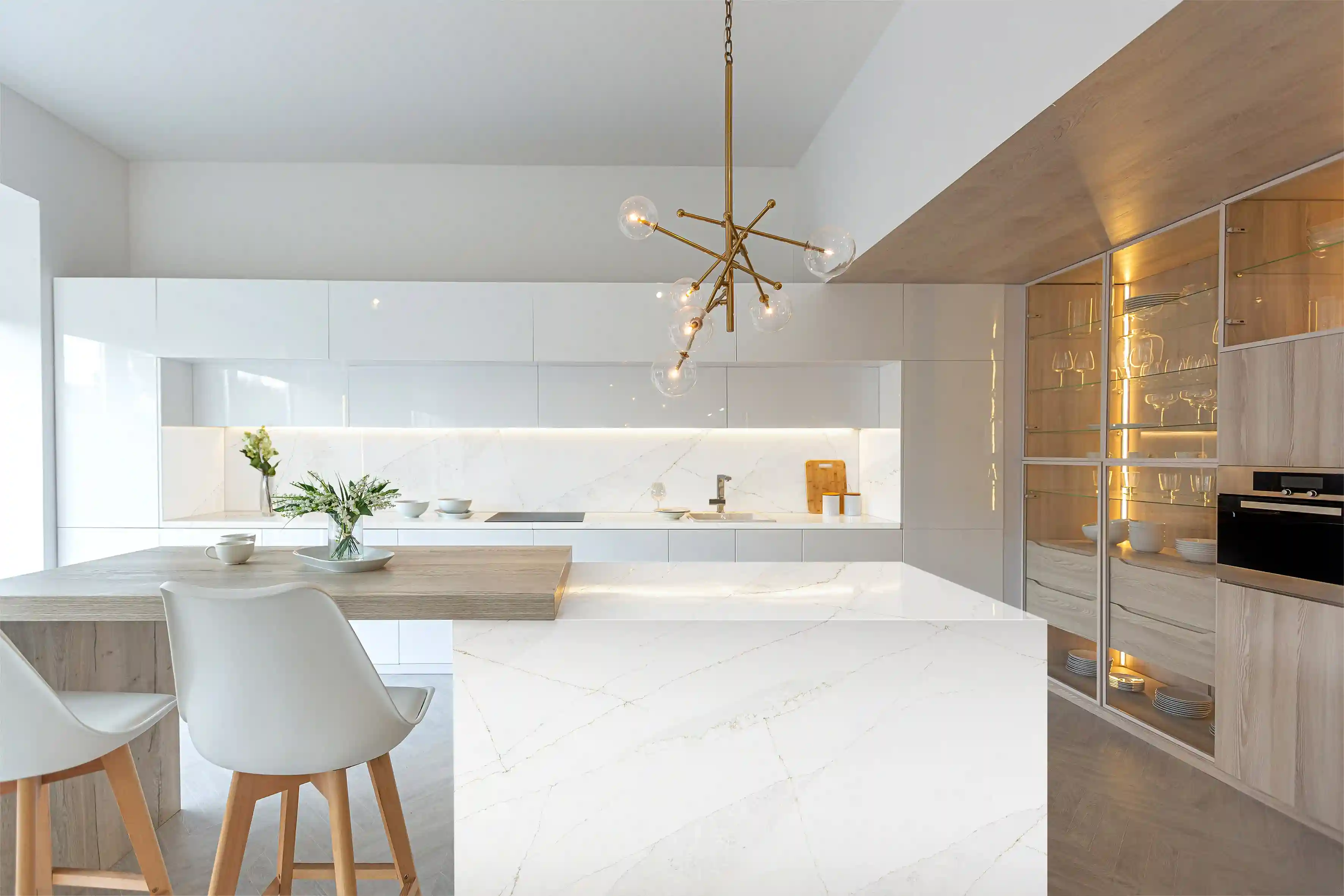Compare Granite Worktops
Quartz and Granite Worktops
You have arrived at our comprehensive companion to help you choose the stylish worktop material for your kitchen.
With both being durable, swish, and practical, quartz and granite worktops are two of the stylish options.
This composition will explain the unique parcels of each, including their benefits and implicit downsides, and will standard both against the factors of continuity, conservation, aesthetics, and cost.
At the end of the companion, you’ll have everything you need to make an informed choice that's acclimatized to you.

What's Quartz Worktops?
The reasons behind the fashionability of quartz worktops are well given and accessible. As a specialist in this area, we can confirm that quartz worktops are a fantastic choice for any kitchen or restroom addition. Let's take a look at what makes quartz such a awful material.
Features and parcels of Quartz
Quartz is an finagled monument material that consists of natural quartz dishes, resins, and colors. This mix creates anon- pervious face that has superior stain, scrape, and heat resistance.

Advantages of Quartz Worktops
Durability
Quartz worktops are truly durable and repel everyday wear and tear and gash and incision while maintaining their shine and luster.
Stain Resistance
Because quartz isnon- pervious, liquids are repelled by it, preventing stains from common ménage products analogous as coffee, wine, or oil painting oil tumbles.
The addition of the resin element to quartz makes it truly strong and therefore flexible to deep scratching from sharp tools or poor treatment.
Heat Resistance
It's always swish to use trivets for hot kissers but quartz is farther heat resistant than other paraphernalia analogous as laminate.

Learning About Granite Worktops
granite worktops have come a dependence in ultramodern kitchen design; their character for continuity, aesthetics, and endlessness have made them a common choice. Knowing about the different attributes of granite worktops will help you make an educated decision when choosing this natural gravestone for your kitchen or restroom design.
Knowing the Description and Properties of Granite
Granite is an igneous gemstone created from cooled magma and consists substantially of quartz, and feldspar, and mica with other minerals along with it. These minerals give granite its unique and varied patterns which display colorways from muted earth tones to vibrant blues and flora. Each arbor of granite will differ in pattern and coloring; these dissonances give granite worktops their unique appeal.

Benefits of Granite Worktops
continuity
granite is known for its continuity and represents a great value as it does n't chip, scrape or stain when sealed. Top quality granite worktops are an excellent choice for all high business areas in a kitchen.
Resistance to Heat
Granite worktops are suitable to repel utmost heat conditions, feel free to place hot pots and kissers directly onto the granite worktop.
Low Maintenance
still, granite is resistant to bacteria and staining, If it's sealed duly. drawing granite is veritably easy; a simple cleaner and water cleaning and your granite is disinfected.
Long Lasting
With proper care, a granite worktop can last ever, and is a real investment into your home.
Comparing Quartz vs Granite
Quartz vs Granite: Which is the Best Worktop Material for You?
Choosing the right worktop material for your kitchen can be a challenging task - quartz or granite? Both types of worktop have different characteristics, and since they are extremely popular, it is essential to understand the main differences between these two options.
Durability
Quartz: Quartz is famous for its outstanding durability. Also, quartz worktops are engineered products made by combining resins with natural quartz crystals, which is exactly why quartz worktops are incredibly durable. And they are resistant to stains, impact, scratches, and heat.
Granite: Granite comes from molten magma deep in the earth's crust, talking about durability - it is naturally durable, however, granite worktops are a little more susceptible to chipping or cracking under heavy pressure compared to quartz.
Maintenance Requirements
Quartz: One of the significant advantages of quartz worktops is that it has very low maintenance requirements and won’t require any special kind of treatments or work to keep it stain-free and resistant to bacteria. In contrast, granite being porous will need to be sealed for stains from spills or liquids to not penetrate the surface and allow bacteria to grow on it.
Granite: Maintenance of granite worktops is relatively low, however, it will require a seal once a year to prevent stains from penetrating into the porous surface.
Aesthetic Appeal
Quartz: Quartz Advances in ultramodern technology allow manufacturers to make quartz worktops in a variety of colors and patterns that can indeed replicate the look of natural monuments like marble or granite. The non-uniqueness and thickness of color and pattern in quartz allows for further design inflexibility.
Granite:granite Because granite worktops are different natural crossbeams, the reason for its beauty is in nature. Each arbor of granite has its own veining pattern that took nature millions of times to prepare and took time for the granite to crop . This vaining adds a remarkable quality to the charm of any kitchen.
Cost
Quartz: Quartz worktops are generally cheaper than granite worktops, with that said, prices will depend on color, pattern, brand and vacuity.
Granite: Granite is more precious than quartz, still, granite worktops may be more precious but is the better choice for heavy pressure and high heat in relief of its superior continuity.
In the end, both accoutrements have pros and cons. Quartz is substantially durable, responsible, and low conservation; while granite is completely natural and is the epitome of oneness in any design with its patterns. In the end it may depend on what you prefer or what you actually bear.



